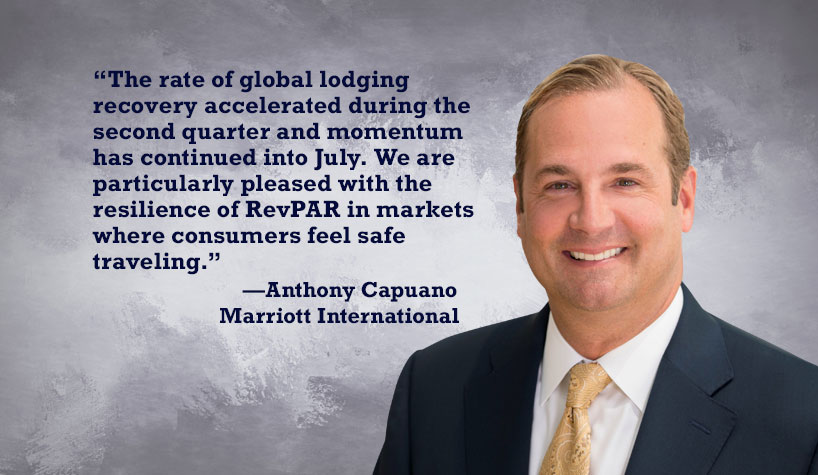Marriott International Inc., in the second quarter ended June 30, reported net income of $422 million, compared with a net loss of $234 million in the same period last year.
“The rate of global lodging recovery accelerated during the second quarter and momentum has continued into July,” said Anthony Capuano, CEO. “We are particularly pleased with the resilience of RevPAR in markets where consumers feel safe traveling. Worldwide occupancy continued to build, reaching 51% for the quarter. We also saw strong improvement in global ADR in the second quarter, which was down only 17% compared to the second quarter of 2019.”
“The swift resurgence of lodging demand once the virus has been largely contained and restrictions have eased has been most evident in Mainland China,” he continued. “Second-quarter RevPAR in Mainland China was on par with the second quarter of 2019, and in April, for the first time since the pandemic began, leisure, business transient and group room nights were all ahead of 2019 levels. In our largest region, the U.S. & Canada, demand stepped up significantly during the quarter, particularly at our resorts. Leisure demand once again led the way, although business transient and group demand also continued to grow. We are seeing more blending of trip purposes, a trend we expect will continue.”
Second-quarter highlights:
- Second-quarter 2021 comparable systemwide constant dollar RevPAR increased 262.6% worldwide, 274.6% in the U.S. & Canada, and 223.2% in international markets, compared to the 2020 second quarter.
- Second-quarter 2021 comparable systemwide constant dollar RevPAR declined 43.8% worldwide, 39.5% in the U.S. & Canada, and 55.6% in international markets, compared to the 2019 second quarter.
- Second-quarter reported diluted EPS totaled $1.28, compared to reported diluted loss per share of $0.72 in the year-ago quarter. Second-quarter adjusted diluted EPS totaled $0.79, compared to second-quarter 2020 adjusted diluted loss per share of $0.57.
- Second quarter reported net income totaled $422 million, compared to reported net loss of $234 million in the year-ago quarter. Second quarter adjusted net income totaled $260 million, compared to second-quarter 2020 adjusted net loss of $184 million.
- Adjusted EBITDA totaled $558 million in the 2021 second quarter, compared to second-quarter 2020 adjusted EBITDA of $61 million.
- The company added nearly 25,000 rooms globally during the second quarter, including roughly 13,000 rooms in international markets and a total of approximately 5,300 conversion rooms. Gross rooms growth was 6.1% for the 12 months ended June 30.
- At quarter end, Marriott’s worldwide development pipeline totaled 2,750 properties and nearly 478,000 rooms, including roughly 19,000 rooms approved, but not yet subject to signed contracts. More than 212,000 rooms in the pipeline were under construction as of the end of the 2021 second quarter.
“Owners continue to seek out our brands,” said Capuano. “Year to date through June, rooms signed were 36% ahead of the same period in 2020 and more than 30% of rooms signed in the first half of this year are conversions. We have also seen strong openings, with approximately 49,000 rooms added to our system in the first six months of the year. For the full-year 2021, we continue to expect gross rooms growth will accelerate to approximately 6%, with net rooms growth now expected to be towards the top end of the 3% to 3.5% range.”
He added, “Marriott Bonvoy hit 153 million members by quarter’s end. We continue to focus on engaging with our loyal customers through multiple offerings beyond hotel stays. Second-quarter co-brand credit card fees surpassed 2019 second-quarter fees, thanks to strong cardholder spend and robust global cardholder acquisitions. Our recent international credit card launches in South Korea and Mexico have seen strong initial success as has our new Uber collaboration in the U.S. Last week, we began offering U.S. customers booking through our digital channels the opportunity to purchase Allianz travel insurance products, providing peace of mind to our customers throughout the travel journey.”
Second-quarter 2021 results
Marriott’s reported operating income totaled $486 million in the 2021 second quarter, compared to 2020 second quarter reported operating loss of $154 million. Reported net income totaled $422 million in the 2021 second quarter, compared to 2020 second quarter reported net loss of $234 million. Reported diluted EPS totaled $1.28 in the quarter, compared to reported diluted loss per share of $0.72 in the year-ago quarter.
Adjusted operating income in the 2021 second quarter totaled $406 million, compared to 2020 second-quarter adjusted operating loss of $85 million. Adjusted operating loss in the 2020 second quarter excluded impairment charges of $24 million.
Second-quarter 2021 adjusted net income totaled $260 million, compared to 2020 second-quarter adjusted net loss of $184 million. Adjusted diluted EPS in the 2021 second quarter totaled $0.79, compared to adjusted diluted loss per share of $0.57 in the year-ago quarter. These adjusted results excluded special tax items of $98 million ($0.30 per share) in the 2021 second quarter and impairment charges of $25 million after-tax ($0.08 per share) in the 2020 second quarter.
Adjusted results also excluded restructuring and merger-related charges, cost reimbursement revenue and reimbursed expenses.
Base management and franchise fees totaled $587 million in the 2021 second quarter, compared to base management and franchise fees of $222 million in the year-ago quarter. The year-over-year (YOY) increase in these fees is primarily attributable to RevPAR increases due to the ongoing recovery in lodging demand from the impacts of COVID-19. Other non-RevPAR related franchise fees in the 2021 second quarter totaled $160 million, compared to $107 million in the year-ago quarter, aided by a $43 million increase in credit card branding fees.
Incentive management fees totaled $55 million in the 2021 second quarter, compared to $12 million in the 2020 second quarter. Hotels in international markets earned $40 million of the fees in the quarter, with particular strength in Greater China.
Owned, leased and other revenue, net of direct expenses, totaled a profit of $19 million in the 2021 second quarter, compared to a $72 million loss in the year-ago quarter. The $91 million increase in revenue net of expenses YOY largely reflects the ongoing recovery in lodging demand from the impacts of COVID-19 as well as $18 million of subsidies received from German government COVID-19 assistance programs.
Depreciation, amortization and other expenses for the 2021 second quarter totaled $50 million, compared to $72 million in the year-ago quarter. The YOY change is primarily due to a $15 million impairment charge recorded in the 2020 second quarter.
General, administrative and other expenses for the 2021 second quarter totaled $187 million, compared to $178 million in the year-ago quarter. The YOY increase primarily reflects lower compensation costs in 2020 as a result of reductions in executive pay, shortened work weeks and furloughs, partially offset by lower bad debt expense in the 2021 quarter.
Interest expense, net, totaled $102 million in the second quarter compared to $119 million in the year-ago quarter. The YOY decrease is largely due to lower debt balances.
Equity in losses for the second quarter totaled $8 million, compared to a $30 million loss in the year-ago quarter. The decrease in losses largely reflects improved results at joint venture properties due to the ongoing recovery in lodging demand from the impacts of COVID-19 and an $8 million impairment charge recorded in the 2020 second quarter.
In the 2021 second quarter, the provision for income taxes totaled a $41 million benefit, compared to a $64 million benefit in the 2020 second quarter. The change in benefit largely reflects higher income before taxes, partially offset by a $118 million reversal of reserves in the 2021 second quarter related to the closure of pre-acquisition Starwood audits.
Selected performance information
The company added 149 properties (24,909 rooms) to its worldwide lodging portfolio during the 2021 second quarter, including approximately 5,300 conversion rooms and roughly 13,000 rooms in international markets. Additions in the 2021 second quarter included eight all-inclusive conversion properties (2,943 rooms) in the company’s Caribbean and Latin America region, part of the nearly 7,000-room deal signed in the first quarter of 2021. Fourteen properties (2,486 rooms) exited the system during the quarter. At quarter end, Marriott’s global lodging system totaled 7,797 properties, with more than 1,451,000 rooms.
At quarter end, the company’s worldwide development pipeline totaled 2,750 properties with nearly 478,000 rooms, including 1,069 properties with more than 212,000 rooms under construction and 114 properties with roughly 19,000 rooms approved for development, but not yet subject to signed contracts.
In the 2021 second quarter, worldwide RevPAR increased 262.6% (a 268.7% increase using actual dollars) compared to the 2020 second quarter. RevPAR in the U.S. & Canada increased 274.6% (a 275.8% increase using actual dollars), and RevPAR in international markets increased 223.2% (a 244.1% increase using actual dollars).
Balance sheet and liquidity
At quarter end, Marriott’s net debt was $9.5 billion, representing total debt of $10.2 billion less cash and cash equivalents of $700 million. At year-end 2020, the company’s net debt was $9.5 billion, representing total debt of $10.4 billion less cash and cash equivalents of $900 million.
The company’s net liquidity was approximately $4.7 billion at the end of the second quarter, representing $600 million in available cash balances and $4.1 billion of unused borrowing capacity under its revolving credit facility.
On July 23, Marriott announced that, on Aug. 9, it will redeem all $400 million aggregate principal amount of its outstanding 3.125% Series N notes due Oct. 15.
Investment spending
Marriott now anticipates that full-year 2021 investment spending will total $575 million to $625 million. Total investment spending includes capital and technology expenditures, loan advances, contract acquisition costs and other investing activities.
“While we are keeping a close eye on the Delta and other variant strains, we are optimistic that the upward trajectory of the global recovery will continue,” said Capuano. “We anticipate that more workers returning to their offices on a hybrid basis will serve as a catalyst for a meaningful increase in business transient and group demand in the fall. Many of our associates are starting to get back on the road, and our largest corporate clients tell us they are beginning to do the same. Our recovery to date has shown us that there is tremendous pent-up demand for the travel experiences we consistently provide. Timelines are hard to predict and will continue to vary by region, but I believe that we are on our way to a full global recovery.”


